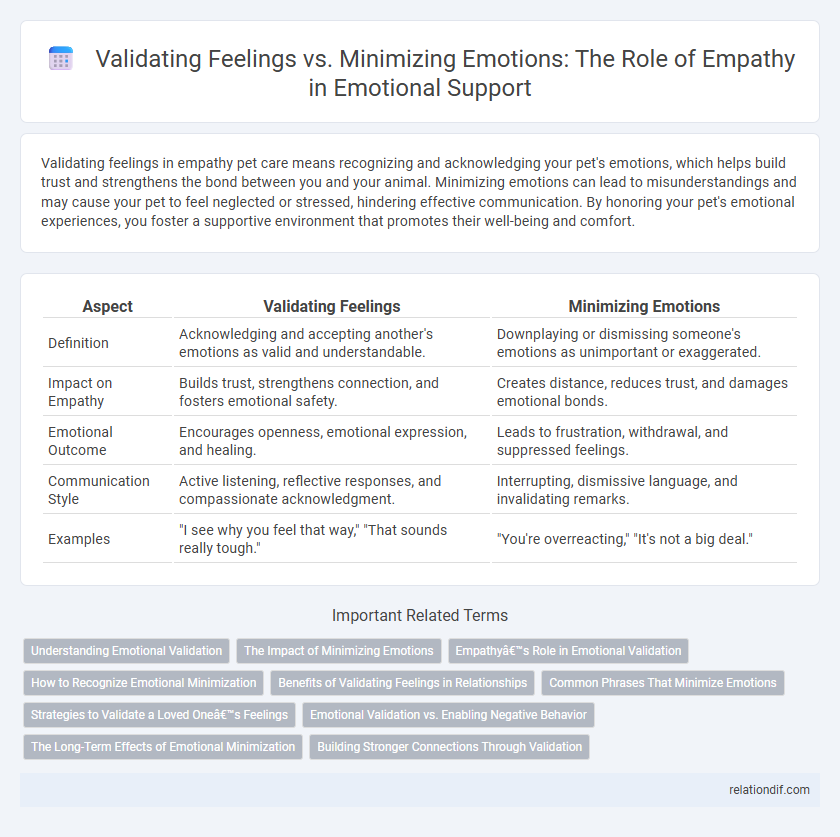Validating feelings in empathy pet care means recognizing and acknowledging your pet's emotions, which helps build trust and strengthens the bond between you and your animal. Minimizing emotions can lead to misunderstandings and may cause your pet to feel neglected or stressed, hindering effective communication. By honoring your pet's emotional experiences, you foster a supportive environment that promotes their well-being and comfort.
Table of Comparison
| Aspect | Validating Feelings | Minimizing Emotions |
|---|---|---|
| Definition | Acknowledging and accepting another's emotions as valid and understandable. | Downplaying or dismissing someone's emotions as unimportant or exaggerated. |
| Impact on Empathy | Builds trust, strengthens connection, and fosters emotional safety. | Creates distance, reduces trust, and damages emotional bonds. |
| Emotional Outcome | Encourages openness, emotional expression, and healing. | Leads to frustration, withdrawal, and suppressed feelings. |
| Communication Style | Active listening, reflective responses, and compassionate acknowledgment. | Interrupting, dismissive language, and invalidating remarks. |
| Examples | "I see why you feel that way," "That sounds really tough." | "You're overreacting," "It's not a big deal." |
Understanding Emotional Validation
Understanding emotional validation involves recognizing and accepting another person's feelings as genuine without judgment or dismissal. Validating emotions fosters trust, reduces stress, and strengthens interpersonal bonds by acknowledging the complexity of human experiences. Minimizing emotions can lead to feelings of isolation and misunderstood pain, hindering effective communication and emotional well-being.
The Impact of Minimizing Emotions
Minimizing emotions often leads to feelings of invalidation, which can exacerbate stress and decrease emotional well-being. Studies show that when individuals' feelings are dismissed, it disrupts trust and undermines communication in relationships. Validating emotions supports psychological resilience by acknowledging experiences without judgment or dismissal.
Empathy’s Role in Emotional Validation
Empathy plays a crucial role in emotional validation by recognizing and affirming others' feelings without judgment, which fosters trust and deeper connections. Validating emotions involves actively listening and conveying understanding, helping individuals feel seen and respected rather than dismissed or minimized. By prioritizing empathy, emotional experiences are acknowledged as legitimate, promoting psychological well-being and encouraging open communication.
How to Recognize Emotional Minimization
Recognizing emotional minimization involves paying attention to statements that downplay or dismiss feelings, such as "you're overreacting" or "it's not a big deal." Validating feelings requires acknowledging the person's emotions as real and significant, even without agreeing with their perspective. Key signs of emotional minimization include ignoring expressed feelings, changing the subject, or offering unsolicited solutions instead of empathetic listening.
Benefits of Validating Feelings in Relationships
Validating feelings in relationships enhances emotional intimacy by acknowledging and respecting a partner's experience, fostering trust and openness. This practice reduces conflicts and misunderstandings by creating a safe space where individuals feel heard and valued. Studies show that emotional validation strengthens relationship satisfaction and promotes mental well-being for both partners.
Common Phrases That Minimize Emotions
Common phrases that minimize emotions, such as "You're overreacting," "It's not that bad," or "Just calm down," invalidate a person's feelings and hinder emotional connection. Validating feelings requires acknowledging emotions without judgment, using expressions like "I understand this is hard for you" or "Your feelings are completely valid." Empathy thrives when emotions are recognized and respected rather than diminished or dismissed.
Strategies to Validate a Loved One’s Feelings
To validate a loved one's feelings, actively listen without interrupting, acknowledging their emotions through affirming statements like "I understand this is difficult for you." Reflect their emotions by summarizing what they've expressed, showing genuine empathy and avoiding dismissive phrases that minimize their experience. Encourage open communication by asking open-ended questions, which helps them feel heard and respected, fostering emotional connection and trust.
Emotional Validation vs. Enabling Negative Behavior
Emotional validation acknowledges and respects an individual's feelings without judgment, fostering trust and psychological safety, whereas minimizing emotions dismisses or downplays experiences, often leading to increased distress and isolation. Effective emotional validation separates the person from their behaviors, supporting healthy expression without reinforcing harmful actions, which contrasts with enabling negative behavior by excusing or overlooking destructive patterns. Prioritizing emotional validation promotes resilience and emotional intelligence, crucial for personal growth and constructive interpersonal relationships.
The Long-Term Effects of Emotional Minimization
Emotional minimization often leads to feelings of invisibility and low self-worth, which can erode trust and damage relationships over time. Persistent invalidation may contribute to increased anxiety, depression, and difficulties in emotional regulation. Cultivating empathy by validating feelings fosters emotional resilience and strengthens interpersonal connections.
Building Stronger Connections Through Validation
Validating feelings fosters trust and deepens emotional bonds by acknowledging and respecting others' experiences without judgment. Empathy-driven validation encourages open communication, reducing emotional barriers and promoting psychological safety. Minimizing emotions, in contrast, undermines connection and can lead to misunderstandings and decreased relational satisfaction.
validating feelings vs minimizing emotions Infographic

 relationdif.com
relationdif.com